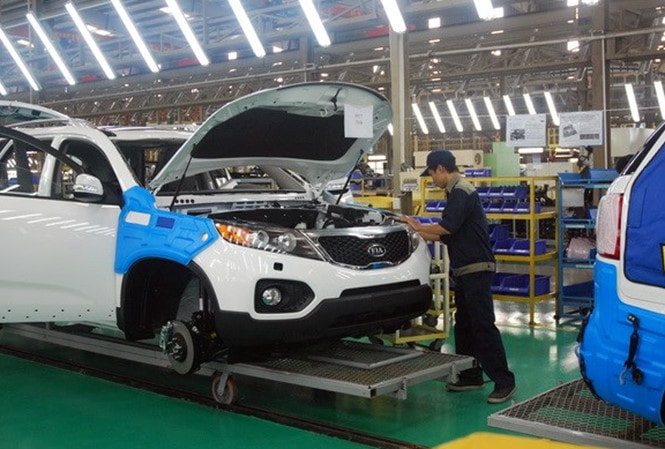Ministry of Finance proposes new tax plan for cars with less than 9 seats
If the Ministry of Finance's proposal is approved by the Government, domestic cars will decrease in price if the localization rate increases, and taxes on spare parts and components may be reduced to 0%.
The Ministry of Finance has just announced the draft Law amending and supplementing a number of articles of the Law on Special Consumption Tax (SCT) on automobiles.
According to the Ministry of Finance, this tax adjustment aims to implement the strategy of developing the automobile industry, at the same time, encourage businesses to increase the localization rate, reduce product costs, and enhance competitiveness between domestically produced cars and imported cars in the context of integration.
 |
| According to the Ministry of Finance, for auto spare parts, if the output and localization rate criteria are met, the proposed tax on spare parts will be 0%. |
According to current regulations, the price for calculating special consumption tax on cars is currently the price sold by the manufacturer or importer. However, according to the assessment of the Ministry of Industry and Trade, this regulation has not encouraged businesses to increase the localization rate, and has not created conditions for domestic cars to compete with imported cars.
At the end of April, in a document on this issue, the Ministry of Industry and Trade also reported that the localization rate for personal vehicles with less than 9 seats is still low compared to the set target. Therefore, the Ministry of Industry and Trade proposed to change the special consumption tax calculation price for the value added created domestically in the form of spare parts.
On that basis, the Ministry of Finance submitted to the Government two options, including: Option 1, the price for calculating special consumption tax on domestically produced cars with 9 seats or less is the price sold by the manufacturing facility minus the value of domestically produced components and spare parts.
Option 2, the price for calculating special consumption tax on cars with 9 seats or less is implemented according to current regulations (the price sold by the manufacturing facility does not deduct the value of domestically produced components and spare parts). Accordingly, the Ministry of Finance proposes to implement according to option 1.
In addition to the special consumption tax, the Ministry of Finance will report to the Government to stipulate specific import tax rates for this type of goods. "For auto parts, if they meet the output and localization rate criteria, the proposed tax on parts will be 0% to both implement the auto industry development strategy and increase the localization rate," Mr. Pham Dinh Thi informed.
However, Mr. Pham Dinh Thi, Director of the Tax Policy Department, admitted that implementing this policy risks violating WTO commitments. “Some countries also implement this policy. Whether or not they will be sued depends on the production situation of each country. Because this can easily lead to violations of WTO regulations, Deputy Prime Minister Vuong Dinh Hue has asked the Ministry of Justice and the Ministry of Industry and Trade to fully evaluate the above content,” Mr. Thi said.
Mr. Thi also said that Japanese enterprises are planning to invest in spare parts factories in Vietnam, serving a small part of the domestic market and the majority will be exported.
If this proposal is passed, the price of domestically produced cars could decrease significantly, potentially competing with imported cars.
Regulations on special consumption tax on environmentally friendly cars The Ministry of Finance has also just submitted to the Government clear regulations on cars running on gasoline combined with electric power (cars charged with a separate charging system). The representative of the Ministry of Finance said that the above regulation aims to encourage consumers to use environmentally friendly vehicles, including those with two engines: gasoline and electric. Under normal conditions, vehicles mainly run on electric motors, gasoline engines are backup, and the amount of emissions into the environment is much lower than other conventional cars. According to the current Law on Special Consumption Tax, cars running on gasoline combined with electricity and bio-energy, in which the proportion of gasoline used does not exceed 70% of the energy used, are subject to a special consumption tax rate equal to 70% of the tax rate applied to cars of the same type. However, due to the lack of clear regulations, some businesses have proposed applying special consumption tax incentives to hybrid vehicles (electric energy obtained by converting from gasoline fuel, such as Lexus HL, Prius, Camry hybrid, Honda Insight). |
According to Tien Phong Newspaper
| RELATED NEWS |
|---|

